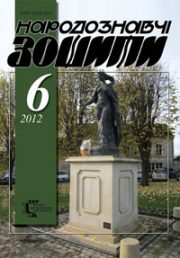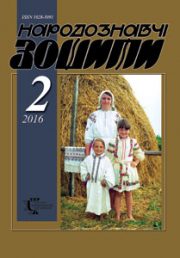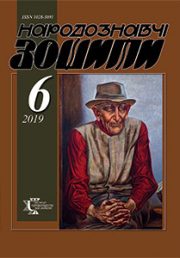The Ethnology Notebooks. 2021. # 2 (158), P. 395—403
УДК 94(44):28-74-42:347](094.2)”20″
DOI https://doi.org/10.15407/nz2021.02.395
Bogdana SYPKO
- ORCID ID: https://orcid.org/0000-0002-3136-9340
- Candidate of History, Associate Professor,
- The Ivan Franko National University of Lviv,
- Department of Modern and Contemporary History of Foreign Countries
- 1, Universytetska str., 79000, Lviv, Ukraine
- е-mail: bogdanasypko@gmail.com
HISTORICAL CONTEXT OF THE ADOPTION OF FRENCH MUSLIM’S PROGRAM DOCUMENTS
Introduction. The Muslim community of France in the early XXI century numbered approximately by 5 million people and was the largest in the West. At the turn of the XX—XXI centuries the process of institutionalization of «French Islam» began.
Problem Statement. Along with the creation of an organization that could coordinate the activities of the largest Islamic federations in France and represent the interests of Muslims to the secular authorities, the Islamic ummah took the initiative to prepare a document that would justify the role of Muslims in the life of the Republic and would be acceptable to all Muslims in France.
Purpose. The article is designed to analyze the main program documents of French Muslims.
Methods. The general scientific methods of analysis and synthesis, as well as special scientific comparative-historical and chronological methods are used in the work. The author adheres to the principle of historicism.
Results. It was found that the urgent challenges facing the French ummah — the radicalization of young people under the influence of external pressure, including ISIL, and social problems, as well as the government’s desire to take control of the situation, pushed the French Council of Islam to deeper compromises, which were reflected in the program documents.
Conclusion. The initiatives to prepare program documents chronologically coincided with the process of institutionalization. It was the Rector of the Grand Mosque of Paris who came up with the idea to prepare the Charter of Islam in France, which he implemented in 1994—1995. D. Boubakeur in 2000—2014 also approved the Principles and Legal Foundations that Determine the Relationship between Civilian Power and Islam in France and the Civil Convention of the Muslims of France for the Common Life but because of the conflict with the representatives, he criticized the Charter of the French Imam in 2017, in the preparation of which he also participated. The French Council of Islam adopted and promulgated the Charter of Principles for French Islam in response to the urgent challenges posed by the Islamist threat. This document is intended to illustrate the loyalty of French Muslims to republican values and laws. And in the context of the radicalization of the minority, the majority sought to demonstrate a desire for compromise, which sometimes led to violations of religious orders.
Keywords: Сharter, imam, islam, Fifth Republic, France, French Council of Islam, program document, ummah.
REFERENCES
- Sypko, B. (2017). Muslim Community in the Life of French Republic (1995—2007). Lviv: The Ivan Franko National University of Lviv [in Ukrainian].
- Boyer, A. (2001). Place and Organisation of Muslim Cult in France. Etudes (Vol. 395, pp. 619—629). Doi: https://doi.org/10.3917/etu.956.0619 [in French].
- Bruce, B. (2010). Promoting Belonging through Religious Institutionalization? The French Council of Muslim Faith (CFCM) and the German Islamkonferenz. Political Perspectives (Vol. 4 (2), pp. 49—69).
- Sfeir, A., & Coste J. (2006). French Council of Muslim Faith tested by time. Hommes&Migrations, 1259, 44—54. Doi: https://doi.org/10.3406/homig.2006. 4417 [in French].
- Zeghal, M. (2005). Constitution of French Council of Muslim Faith: political recognition of French Islam? Archives de sciences sociales des religions, 129. Doi: https://doi.org/10.4000/assr.1113 [in French].
- Sypko, B. (2013). The Problem of Institutionalization of «French Islam» in 1990—2003. Visnyk of the Lviv University. Series History (Issue 48, pp. 228—242). Doi: http://dx.doi.org/10.30970/his.2013.48.541 [in Ukrainian].
- El Karoui, H., & Jardin, A. (2016). French Islam is Possible. Paris: Institut Montaigne [in French].
- (1995). Charter of Muslin Faith in France. In Y. Azeroual. Faith and Republic (Pp. 181—186). Paris: Editions Patrick Banon [in French].
- (2000, January, 28). Principles and legal foundations governing the relations between the public authorities and the Muslim faith in France Retrieved from: http://www.ambafrance-jo.org/1-9-Pouvoirs-publics-et-culte. (Last accessed: 19.02.2021) [in French].
- (2014). Citizen’s Convention of Muslims of France for Living Together. Conseil Francais du culte musulman [in French].
- (2017). Project of Charter of the Imam of France. Retrieved from: http://www.umfrance.fr/images/CharteDeImamDeFrance-Contribution-UMF.pdf (Last accessed: 19.02.2021) [in French].
- (2017). Muslims of France. Charter of values and principles. Retrieved from: http://www.uoif-online.com/wp-content/uploads/2017/04/CHARTE-MUSULMANS-DE-FRANCE-15.04.17.pdf (Last accessed: 19.02.2021) [in French].
- (2021, January, 18). Presentation of the Charter of Principles for Islam of France to the President of the Republic. Retrieved from: https://www.cfcm-officiel.fr/presentation-de-la-charte-des-principes-pour-lislam-de-france-au-president-de-la-republique/ (Last accessed: 19.02.2021) [in French].
- Cesari, J. (1994). Being a Muslim in France: Associations, activists and mosques. Aix-en-Provence: Institut de recherches et d’études sur le monde arabe et musulman. Retrieved from: http://books.openedition.org/iremam/852 (Last accessed: 19.02.2021) [in French].
- El Khatib, M. (2003). The process of bringing representative bodies of French Islam in France. From Pierre Joxe to Nicolas Sarkozy: 1990—2003. Thesis produced under the supervision of Gilles Richard [in French].
- Helly, D., & Lefebvre, S. (Ed.). (2005). Why to create a unitary Muslim body in Belgium, Spain and France? In S. Lefebvre. Religion in public sphere. Montreal: Presses de l’Universite de Montreal. Retrieved from: http://books.openedition.org/pum/10491 (Last accessed: 19.02.2021) [in French].
- Zwilling, A.-L. (2014). The CFCM and communautarisme. Retrieved from: http://www.communautarismes.hypotheses.org/44/ (Last accessed: 19.02.2021) [in French].
- (2015, November, 25). The CFCM announces a «certification» of imams to promote an «Islam tolerant». Retrieved from: http://www.crif.org/fr/ revuedepresse/le-cfcm-annonce-une-certification-des-imams-pour-promouvoir-un-islam-tol%C3% A9rant/58069 (Last accessed: 19.02.2021) [in French].
- (2016, May, 10). The CFCM establishes the «teologic council». Retrieved from: http://www.crif.org/fr/revuedepresse/le-cfcm-instaure-un-conseil-theologique (Last accessed: 19.02.2021) [in French].
- (2016, July, 5). Islam — the CFCM wants to «accompany» converts to Islam, «before and after». Retrieved from: http://www.crif.org/fr/revuedepresse/islam-le-cfcm-veut-accompagner-les-convertis-lislam-avant-et-apres (Last accessed: 19.02.2021) [in French].
- (2017, March, 31). An Imam Charter adopted by the French Council of Muslim Faith. Retrieved from: http://www.crif.org/fr/revuedepresse/france-une-charte-de-limam-adoptee-par-le-conseil-francais-du-culte-musulman (Last accessed: 19.02.2021) [in French].
- Sypko, B. (2018). Interreligious Dialogue between French Jews and Muslims in the Early XXI century: Institutional Level. The Ethnology notebooks, 4 (142), 832—843. Doi: https://doi.org/10.15407/nz2018.04.832 [in Ukrainian].
- (2018, January, 3). The Paris Mosque withdraws from the French Council of Muslim worship. Le Parisien. Retrieved from: http://www.leparisien.fr/societe/la-mosquee-de-paris-se-retire-du-conseil-francais-du-culte-musulman-03-01-2018-7482261.php (Last accessed: 19.02.2021) [in French].
- (2020, October, 2). Statement by Emmanuel Macron, President of Republic, on the fight against separatism. Retrieved from: https://www.vie-publique.fr/discours/276537-emmanuel-macron-02102020-separatismes (Last accessed: 19.02.2021) [in French].
- (2020, December, 9). Bill № 3649 confirming respect for the principles of the Republic. Retrieved from: https://www.assemblee-nationale.fr/dyn/15/textes/ l15b3649_projet-loi (Last accessed: 19.02.2021) [in French].







